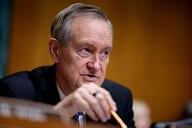You have /5 articles left.
Sign up for a free account or log in.
Legislation introduced in Congress Thursday would nullify an executive order signed by President Bush in 2001 limiting public access to presidential documents and greatly expanding the scope of executive privilege. Rep. Henry A. Waxman (D-Calif.) announced the bipartisan bill during a House of Representatives subcommittee hearing that featured widespread condemnation of the president's action, not only for its perceived effect of restricting research and freezing the flow of public information, but also for its role in building back-ups at the presidential libraries.
The Presidential Records Act Amendment of 2007 would largely restore the 1978 Presidential Records Act to its form under President Reagan, limit executive privilege to current and former presidents, and set firm deadlines for the review of documents before their public release. A similar bill never made it out of Congress back in 2004.
“History is not partisan,” said Waxman, a sponsor of the bill and chair of the House’s Committee on Oversight and Government Reform, a subcommittee of which held the hearing on presidential records Thursday. “Historians and scholars need access to our nation’s history as it happened, not as a former president wished that it happened.”
Bush’s order, back in the news of late amid protests of his proposed library at Southern Methodist University, effectively grants current and former presidents -- and their heirs -- far greater discretion to indefinitely classify documents long after the 12-year post-presidency period during which executive privileges have typically applied. Also, for the first time, vice presidents can likewise enjoy the privilege.
“Any presidential library created under this executive order will be a mockery,” said Steven L. Hensen, a past president of the Society of American Archivists and director of technical services for Duke University’s rare books library. “There are records, but they could be embargoed by Laura Bush or Jeb or whoever.”
In defense of the order, Allen Weinstein, archivist of the United States, testified that “there should be no question that, to date, Executive Order 13233 has not been used by former presidents or the incumbent president to prevent the opening of records to the public.”
More than 2.1 million pages of presidential records have been opened since November 2001, when the order went into effect, Weinstein said, and on “only one occasion” did the order restrict the release of documents. A total of 64 pages, 30 of which were duplicates, were kept closed at the Reagan Library, Weinstein said.
Thomas S. Blanton, for one, was not impressed.
Blanton, director of the non-governmental National Security Archive at George Washington University, said that from 1994 to 2001, the Reagan Library alone opened more than 5 million pages -- more than twice the total number of pages opened by the entire presidential system since that time. And while the number of pages actively restricted may be low, Blanton says the lack of a time limit on a presidential review of documents before their release has contributed to a delay in response time that grew from 24 months in November 2001 to 78 months in February of this year.
For instance, he said his 1997 request for the Malta Summit transcript from George H.W. Bush's library -- a Russian version of which is already available publicly -- was forwarded first to agencies for declassification review in 2001, and then to the White House in 2005. He’s still waiting.
Bush’s order is only partly to blame, said Blanton, who also cited staff and resource shortages at the presidential libraries, even as a wave of electronic documents being sent their way has stressed the system still further. The backlogs at the Reagan, Bush and William J. Clinton Libraries extend up to five years, Weinstein confirmed. The average combined time for National Archives and Records Administration staff to complete their reviews has risen to 210 days, from 170 in October 2005 and 90 in April 2004.
Yet, while speakers briefly touched on resource shortages, the focus Thursday remained primarily on the open access issues at play. Rep. Michael Turner of Ohio, the senior Republican on the House Subcommittee on Information Policy, Census and National Archives, redirected the attention to the national security issue, often invoked by the executive order’s defenders, by asking Weinstein whether the events of September 11 give him “additional pause in areas where you didn’t have pause before.” Weinstein’s affirmative answer, Turner said, is important in providing a context to the debate, although scholars insist that exemptions under the original law were more than adequate in keeping sensitive security documents closed.
Scholars, meanwhile, pointed to other national interests achieved by opening the documents.
"We need to think of presidential papers as raw material, like iron," said Anna K. Nelson, a distinguished historian in residence at American University who represented the Society for Historians of American Foreign Relations Thursday. The research, done by a few, trickles down through books, articles and, ultimately, textbooks, to the many, she said -- "from iron to steel."




